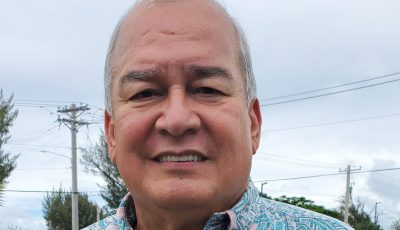Gone: Gentler days!
The ripple effects of casino here have spurred other investments, according to an announcement from the administration. It must be hopeful good tidings given the sluggish growth of the local economy.
Three issues emerge out of this feel good assertion: the insecurity of a fickle single-engine economy on tourism, piled by the obvious lack of economic diversification, and the persistent lack of a plan to develop other sectors.
Furthermore, the GAO report on the reduction of foreign workers here by 2019 predicts a huge decline in the NMI’s ability to pay its debts. If the NMI doesn’t impose additional taxes from casino this could exacerbate bankruptcy! When we do the mea culpa in Washington, they’d quiz us to death why haven’t we taxed the casino business here.
Even more alarming is the NMI’s obligation under the Settlement Fund that increases substantially down the stretch, e.g., $45 million by next FY. If it defaults, it means it must make a one-time payment of some $800 million. Which side of bankruptcy do we dig to fork out this amount? Not a very reassuring fiscal situation, is it? Is this an existential dread or threat or both?
Yet, we take a glimpse at federal policy under the Agreement that says Uncle Sam is supposed to provide for a “progressively higher standard of living…” Yet it hurled U.S. Public Law 110-229 that took away basically everything that has to do with labor, a tandem of the economy. This policy definitely needs expedited re-evaluation with the view to reinstating what was denied the NMI. If this isn’t done, then prepare for persistent bankruptcy up ahead.
What is the meaning and dangers of a single-engine economy such as ours? If it crashes it instantly translates into far less revenue for the local treasury. It would force cuts in public services because of the lack of funds. Thus, insecurity seems the only currency blinking persistently on our monitor.
Review: Realistically, has development helped families here strengthen their buying power or has it gotten worse? A purposeful review is in order!
In quantifying development, statisticians use gains in average income, life expectancy or years spent in school. However, it requires more than a simplistic probe.
“What many do not realize, however, is that such metrics, while useful, do not tell the entire story of development. In fact, to understand how developed a country is, we must also grasp how people’s lives are affected by progress,” according to Selim Jahan, director of the UN Human Development Report Office and lead author of the Human Development Report.
“And to understand that, we must consider the quality of the change that is being reported.” The mixed metrics doesn’t really show how development has affected people in the community. Yes, we’ve seen increase in the number of our children going to school, among others. It presents yet another query: are they learning and would the acquisition of basic education help them over the long haul?
Breakdown: We break the query down further: how has it help families throughout the NMI? If you use income, it brings into focus more than 14,000 employees who are still earning poverty income level and below. For all the “feel good” spouts about suspect growth, the quality of life is furthest from reining-in progress to families here.
Has the NMI retired the debt of $700 million with the old retirement program? How about some $11 million for CDA? All these have forced the poor quality of life from inching upwards and it takes more than just “temperamental” growth to instill confidence in the future financial posture of the NMI.
Alternative: The NMI must jerk itself out of her usual mañana so it comes to grips with the fact that Santa Claus often misses the islands in December.
The way out of this hardship is venturing into wealth creation. In this connection, I find special interest in what Charles Koch, a Libertarian-leaning billionaire said recently about this concept or why he’s giving millions of dollars to the Catholic University of America.
Turns out the chairman and chief executive officer of Koch Industries “finds two aspects of the Washington-based business school highly attractive: at the personal level, its emphasis on character and virtue; at the social level, its message that the right way to get ahead and contribute to your community is by creating wealth and opportunity for others.” He added he’s “is attracted to Catholic University’s effort to put the human person at the heart of business life.”
It’s about character and virtue and the right way to contribute to our community. “One can be in business and pursue bad profit,” Mr. Koch explains. “That is, by practicing cronyism—rigging the system to undermine competition, innovation and opportunity, making others worse off. Good profit should lead you to improve your ability to help others improve their lives.”
Master: Thus, life has morphed into selecting which bank turns into our lifetime master! A friend related, “I’m working on my Ph.D. but then by the end of the program I’d owe some $280,000 in student loan.” His student and real estate loans are “enough to turn the bank my lifetime master and partner!
Smoke: No longer do we see smoke billowing above the old village when families light up the old firewood stove to cook breakfast at first break of dawn. Each day begins with roosters crowing on trees or cage outside at first break of dawn to remind us of a new day in paradise. It’s gone!
Guahan: Guahan’s Gov. Eddie Calvo this week appeared before the UN Special Political Committee on Decolonization and presented his people’s aspiration for self-determination.
For advocates of indigenous rights, such a plan is ripe. It sets the path to allow the Chamorros on Guahan to determine their political future. Another 100 years of the same arrangement is tantamount to complete marginalization of the Chamorros at home! This would be unconscionable.



























